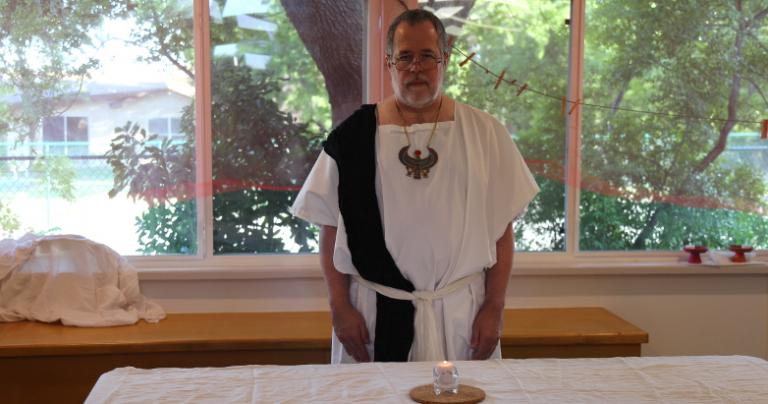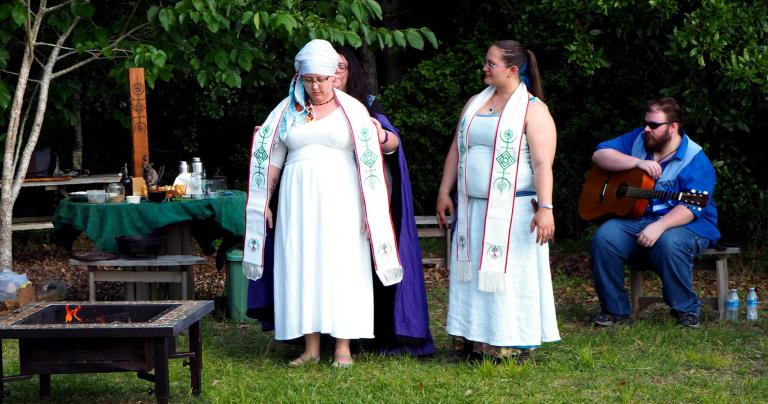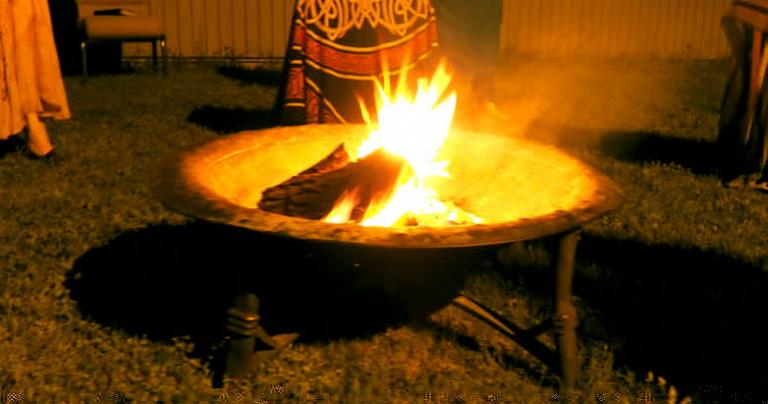A comment on last month’s Conversations Under the Oaks asked a question that requires its own post. James asked:
I have a question concerning Pagan seminary, ministry, and priesthood. I’ve sort of felt a calling throughout my life to be a spiritual leader, but there are no accredited seminaries for Pagans (as far as I can tell). Do you need to go to seminary to be a priest or something of that nature?
There is an entire chapter devoted to priesthood in The Path of Paganism. It begins with this definition:
Priesthood is both a role and a relationship. A priest is a servant of a God or Gods, but not all who serve the Gods are priests. A priest has a clear relationship with a deity or deities, but having a patron deity does not make you a priest.
Pagan Priests serve their Gods, they mediate for their Gods, and they serve their communities. But they do so in ways that may not resemble what you see from your local Protestant minister or Catholic priest. Some of this is covered in the blog post Priesthood – A Modern Pagan View. Some necessary clarifications are in Pagan Sacred Callings That Aren’t Priesthood. And if anybody thinks Pagan priesthood is glamorous, read Sore Quadriceps and the Reality of Pagan Priesthood.
If you feel the call to priesthood, I strongly encourage you to read all these posts. Not because I need the pageviews, but because you need to know exactly what you’re getting into – and what you aren’t.
There is no universal answer to the question of how to prepare for Pagan priesthood – or if you should prepare. Perhaps your calling is to priesthood. But perhaps it’s to do or be something else. Discernment is required.
Who is calling you?
Priesthood is a calling, and calls come from somewhere. I’m a polytheist and a Nature-loving Druid. I was called to priesthood by Cernunnos, then again by Danu. I was called to service by the Morrigan, but that service does not include priesthood. I have on-going relationships with other deities and spiritual beings that do not rise to this level.
If you are not a polytheist, you may frame this question differently. Perhaps the call is coming from Nature, or your community, or from your higher self.
The way you answer this question has a huge bearing on what kind of priest you are being called to become, which in turn has a huge bearing on how you should prepare for that service.
What work are you called to do?
In a modern Pagan context, “priesthood” and “spiritual leadership” are rather broad concepts. Some Wiccan traditions consider all initiates to be priests or priestesses (I generally use “priest” to include all genders). Some traditions – like ADF – define priesthood in very specific terms and have very specific requirements for it. Still other traditions – like CUUPS – don’t use the term “priest” and elect their leaders. All these people do very different things – saying “I’m called to be a priest” doesn’t provide enough specifics.
Are you called to serve a particular deity with regular offerings and prayers? To tell Their stories and raise the awareness of Them in the wider world? To embody Their virtues in your daily life? That requires one type of training.
Are you called to serve a particular community? To lead public rituals? To provide spiritual counseling? To officiate rites of passage? That requires a different type of training.
Who are you called to work with?
In addition to their work with and for deities, priests serve their communities. What community are you called to serve? To put it bluntly, you can’t serve a community if you don’t have a community. I’ve seen some Pagans assume that if they become a priest a community will spring up around them. I’ll give them the benefit of the doubt and assume they’re naïve and not egomaniacs.
Communities will tell you what they need from you, though rarely do they tell you directly. Your job is to listen and then to figure out how you can best respond.
Some communities won’t call you a priest. I served Denton CUUPS as Coordinating Officer for 12 years. I led rituals, officiated rites of passage, provided spiritual counseling, and represented the group in the Pagan and interfaith communities. Sometimes people unfamiliar with CUUPS would ask if I was the High Priest or sometimes if I was the minister. My answer was always the same: “I’m the Coordinating Officer.”
Focus on the work that needs to be done, not on the title.

What are your expectations of life as a priest?
If you think there’s a paying job in this, you haven’t been paying attention. If you think a title will earn the respect of other Pagans, you really haven’t been paying attention. If you think there’s anything glamourous about priesthood, go read Sore Quadriceps and the Reality of Pagan Priesthood. Here’s an excerpt:
This is the reality of Pagan priesthood – it’s a lot of work. Not just the mental work of thinking, writing, and talking to people, though that’s important. Not just the spiritual work of meditation, prayer, and offerings, though that’s important too. It’s also a lot of hot, hard, dirty physical work.
Why? Because it’s necessary.
If you don’t know what to expect, talk to Pagan priests. Ask them what they do. Ask them about the phone calls and e-mails they get. Ask them about the tasks their Gods give them to complete and the messages they’re told to relay.
My priestly work is some of the most difficult and trying work I’ve ever done. It’s also some of the most fulfilling. The two go together. Make sure your expectations are realistic.
What are you already doing?
I make my living as an engineer. If a young person asks me about engineering as a career I ask how they’re doing in math and science classes. I encourage them to take things apart and put them back together (which is a lot harder than it was when I was a kid – miniaturization has its downside). If they’re older, I suggest college-based pre-engineering summer programs. None of those things will make them an engineer, but it will help them figure out if engineering is for them, and it will give them a good start when they finally get to college.
How’s your daily spiritual practice: prayer, meditation, and offerings? What are you reading: Pagan books, but also history and literature? Are you performing rituals? Writing your own rituals? Doing post-ritual analysis to see what went well and what can be improved?
Are you serving your communities? Picking up trash on the side of the road? Visiting sick friends? Checking in on elders?
If you’re a Catholic, you can’t say Mass unless you’re an ordained priest. While some Pagan traditions restrict some activities to people with certain qualifications, outside of those traditions there is very little you can do as a priest that you can’t do as a lay person.
So all that stuff you want to do as a Pagan priest? What are you waiting for ? Go do it.
Make sure you understand your limitations, especially when it comes to spiritual counseling. Pretending you know more than you do can be harmful, to others and ultimately to yourself. Of course, that’s true even if you are a priest.
But what you do is a lot more important than the titles you carry.
Different routes to different priesthoods
Sometimes you start doing the work and after a certain amount of time you’re asked to take priestly vows. My relationship with Cernunnos goes back to childhood, but it was several years after I was reintroduced to Him before He said “be my priest.” With Danu, it was only a few months.
Other times you do the work and the call never comes. So be it. I am not a priest of the Morrigan, but I am honored to be Her Druid.
My ordination is in a lineage separate from my work with these Gods. That required formal study and training.
My CUUPS leadership was not priesthood, even though I was doing a lot of priestly work. I knew I needed some formal training, so I signed up for the OBOD course – even though OBOD doesn’t ordain and doesn’t use the term “priest” either. It was about learning the necessary skills, not about obtaining a certification.
Education vs. certification
I’m a strong supporter of education and of life-long learning. But our mainstream society overvalues certifications and undervalues learning by doing.
There is one active Pagan seminary: Cherry Hill. They offer Master’s Degrees, including the M.Div., the standard degree for ministers. They are not yet accredited, but they are working toward accreditation. If your calling requires a seminary degree (such as military or hospital chaplaincy) they are a serious Pagan option.
If you don’t need an M.Div., your time and money will likely be better spent elsewhere. Cherry Hill’s program is designed to meet the requirements of mainstream accrediting agencies, not to create temple priests. That said, some of their individual courses will be very helpful to priests of any description, especially their courses on counseling.
ADF has a rigorous clergy training program. I haven’t done it (I’m an ordinary member in ADF and will remain so) but I know people who have and they speak highly of it. But it’s intended to make ADF priests, not generic Pagan priests.

Some other traditions have their own training programs – I’m not familiar with any of them. As with ADF, most of them are designed to train priests in their tradition.
My own priestly training has been a combination of reading and study, two training programs, watching other priests and seeing what they do, and a whole lot of learning by doing.
Find the training – and if necessary the certification – that matches your calling.
First comes discernment
But before you do anything, figure out if you really are being called to priesthood. Who is calling you, what are they calling you to do, and who are they calling you to work with? Make sure you know what you’re getting into. Then start doing the work, and seek the training you need.
I am honored to be a priest and to do the work of a priest. Pagan priesthood is an old and noble calling. It is a life-long commitment and it is a lot of work – it is not easy, and many times it is not pleasant. But it is necessary work, and it is holy work.
If your discernment leads you to persue priesthood, I wish you well.















